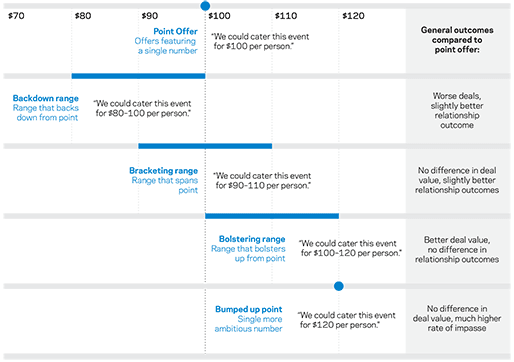In you’re in the middle of negotiations, sometimes it’s best just to put your offer on the table. But what if you didn’t make a single offer and instead put out a range of offers?
For years, the prevailing wisdom was that range offers were a bad idea, but recent research from Columbia Business School “has convinced us otherwise. In some cases, putting a range on the table can be a smart move.”
Here’s a summary from Columbia Ideas at Work:
Through a series of five studies, we found that negotiators who opened with range offers were viewed just as positively by their counterparts, and in some cases more so, than those who opened with a point offer. We also found that those who opened with a bolstering range ended up securing higher final settlement prices than those who opened with point offers or other kinds of range offers. Counter to earlier assumptions, we’ve concluded that both ends of a range offer shape offer-recipients’ perceptions about what a reasonable outcome might look like, and bolstering ranges can pull final settlements in a direction that favors the offer-maker.
In other words, that “selective attention” story we’d been telling for years doesn’t fit the data. People on the receiving end of range offers don’t hear just the number at the end of the range that’s attractive to them — both numbers have an effect. Or to put it another way: ranges can work. And one reason is because they shape offer-recipients’ views of the offer-maker’s limits.
We also found that bolstering ranges outperformed point offers for a second reason: those receiving bolstering range offers thought it would be rude to respond aggressively and thus often countered with a less assertive price than those who received point offers.
So what’s the best state-of-the-art advice, given this research?
Whether you’re haggling with a freelancer, bargaining for a wedding venue, or negotiating your own salary, our first recommendation is: don’t use backdown ranges. In a pilot study we found that a third of people spontaneously constructed backdown ranges when asked to make a range offer. But our studies showed that backdown ranges frequently lose value and show no relationship benefits beyond point offers or bracketing range offers. In a salary negotiation, if you are tempted to ask for $60,000, don’t ask for $55,000 to $60,000.
Read the entire article for more useful tips.

